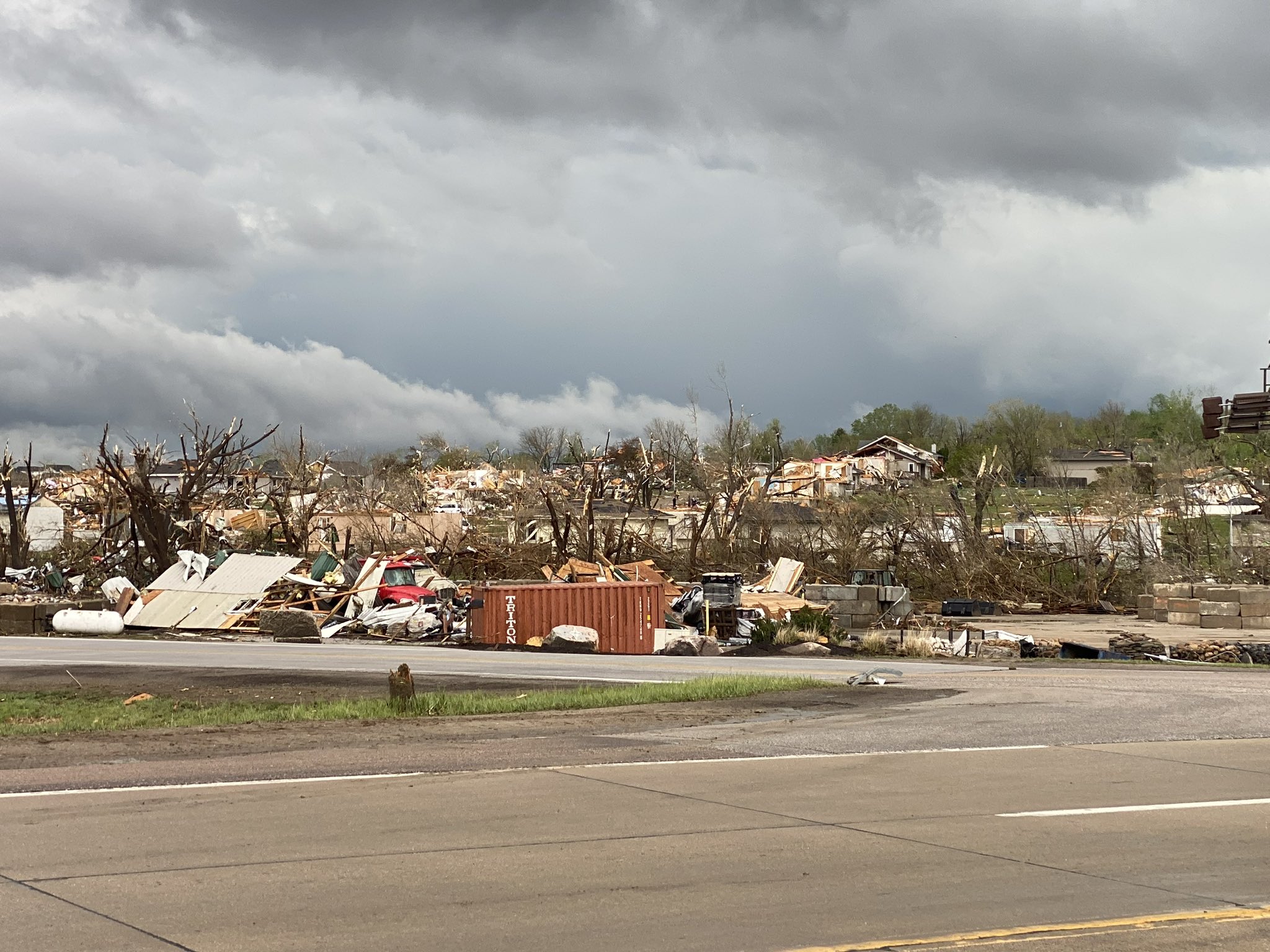What we’re watching: Weekly disaster update, April 29

We know all too well that disaster can strike anytime, anywhere in the world. Some disasters make headlines; others do not. Here at the Center for Disaster Philanthropy (CDP), we monitor the status of disasters worldwide and compile a list of the ones we’re tracking weekly, along with relevant disaster-related media coverage.
Here’s what we’re watching for the week of April 29, 2024.
New or Emerging Disasters
Tornadoes – Central and Midwest U.S.: At least five deaths were confirmed after several severe storm systems spawned multiple tornadoes across Iowa, Missouri, Nebraska, Oklahoma and Texas on April 26 and 27. More than 100 tornadoes sparked flood and storm alerts for millions of people. Over 150 homes were damaged or destroyed in Omaha, Nebraska alone.
Governor Kevin Stitt of Oklahoma issued a state of emergency for 12 counties after the state department reported around 100 injuries, and some of the hardest hit towns, Holdenville, Marietta and Sulphur, showed flattened homes and overturned vehicles. Multiple businesses were destroyed, including a Dollar Tree distribution center, a dominant source of supplies, including groceries. The loss of the distribution center, which serves many smaller towns, could be significant.
A preliminary investigation by the National Weather Service found that some tornadoes had wind gusts of above 136 miles (218 km) per hour, reaching level three on the Enhanced Fujita scale, which rates tornado intensity based on the severity of the damage caused. More information will be released as authorities continue to assess damages and confirm tornadoes.
You can donate to the CDP Tornado Recovery Fund to support medium- and long-term recovery in tornado-affected communities across the United States.
For more, see our 2024 U.S. Tornadoes disaster profile.
Complex Humanitarian Emergency – Burkina Faso: On April 25, a new report by Human Rights Watch (HRW) found the Burkina Faso military executed at least 223 villagers as part of a widespread campaign against civilians accused of collaborating with Islamist armed groups. Mass killings are believed to be among the worst army abuses since 2015 and may amount to crimes against humanity. Following the HRW report, Burkina Faso suspended the BBC and Voice of America radio networks over their coverage and broadcast of the mass killings. The government of Burkina Faso has since strongly rejected and condemned the accusations.
Complex Humanitarian Emergency – Ethiopia: A recent round of conflict and hostilities between armed forces from Amhara and Tigray region in contested territories have resulted in more than 50,000 displaced people. Many of the displaced people are women and children who have sought refuge within host communities in Kobo, North Wello, and Sekota and Wag Hamra zones. Due to a lack of resources and access, assistance by humanitarian partners and the government is not proportional to the needs of the displaced people, according to the United Nations. The international community has also called for dialogue and urged the de-escalation of conflict and protection of civilians.
For more, see our Ethiopia Humanitarian Crisis disaster profile.
Drought – Vietnam: According to Save the Children, weeks of heat waves have caused salt to seep into fresh water sources and resulted in limited access to fresh water for about 74,000 households along the Mekong River Delta.
As of April 24, four provinces have declared a state of emergency due to saltwater intrusion into fresh water sources. The United Nations Children’s Fund (UNICEF) reported extremely high levels of saltwater intrusion would last through May 2024 and cause an increase in the number of provinces and households affected. The Mekong Delta already has one of the highest child poverty rates and consists of communities highly dependent on rice farming and fishing.
Tornadoes – China: At least five people were killed and 33 injured after a tornado struck Guangdong province on April 27. The twister was preliminarily rated at level three intensity out of five and damaged at least 141 factory buildings. Media reported at least 110,000 displaced people and 25,000 evacuated in shelters. The China Meteorological Agency expects heavy rain and storms to continue until the end of April. Tornadoes are not frequently experienced in China and average around 100 tornadoes per year.
Heat wave – Bangladesh: As a searing heat wave grips South and Southeast Asia, Bangladesh is experiencing its longest heat wave in 75 years. The heat wave reached its 29th day on April 28, the same day schools reopened after remaining closed for almost a week, impacting around 32 million children, due to high temperatures.
A 72-hour heat wave alert remains until April 30 as the season’s highest temperature was recorded at 42.7 degrees Celsius (109 degrees Fahrenheit). Experts found Bangladesh’s average maximum temperature this season to be 4-5 degrees Celsius higher than the last 30-year average.
Extreme heat webinar
It gets hotter every year: How to proactively fund the heat crisis

Previous/Ongoing Disasters
Flooding – Afghanistan and Pakistan: The humanitarian impact from floods in Afghanistan and Pakistan continues to rise after at least 130 fatalities were recorded. Pakistan’s Disaster Management Authority reported at least 3,500 damaged homes across five districts due to heavy rain causing landslides and flooding. More rain was reported on April 28, causing over 10 deaths and 50 homes damaged in almost 20 districts of Khyber Pakhtunkhwa. Most of the casualties in Afghanistan resulted from collapsed roofs, as over 600 homes were damaged or destroyed.
For more, see our Afghanistan Humanitarian Crisis disaster profile.
Flooding – Oman and the United Arab Emirates: A new study found climate change “most likely” exacerbated heavy rains that resulted in at least 25 deaths in Oman and the United Arab Emirates (UAE) since April 14.
Dubai’s airport faced severe disruptions and only returned to full capacity on April 23, nearly a week after heavy rain dumped two years’ worth of rain. The UAE established a flood damage assessment committee with a focus on housing, infrastructure, energy and dams. The committee has also shared its goal to ensure a speedy recovery and enhanced resilience for future extreme weather incidents.
Volcano – Indonesia: Mount Ruang’s eruption on April 16 was one of the biggest in the last 50 years, but against all odds, it left no casualties. A new study found that in addition to a speedy evacuation, the 800 plus residents of the Ruang island were well prepared even with little government intervention. While the volcanic activities have since receded, the island continues to be closed off as of April 27.
In addition to the disasters listed above, we actively monitor the following disasters or humanitarian emergencies. For more information, see the relevant disaster profiles, which are updated regularly.
- Gaza-Israeli Humanitarian Crisis
- Haiti Humanitarian Crisis
- Horn of Africa Hunger Crisis
- Sudan Humanitarian Crisis
- 2024 Chile Wildfires
- 2024 Japan Earthquake
- 2024 North American Wildfires
- 2023 Libya Floods
- 2023 Turkey-Syria Earthquake
Complex Humanitarian Emergencies – Nigeria
Many places worldwide are experiencing emergencies caused by conflict, climate change, drought, famine, economic challenges and other conditions that combine to create a complex humanitarian emergency (CHE). CDP maintains complete profiles on several CHEs, and what CDP considers Level 1 CHEs are profiled in this weekly blog post and tracked.
In addition to battling one of its worst economic crises, with soaring inflation at a 28-year high, Nigeria is seeing a resurgence in mass kidnappings, with over 600 people abducted since February 2024. On February 29, suspected Boko Haram militants ambushed and abducted more than 200 internally displaced people (IDP) who were gathering firewood outside the camps, a common practice due to limited aid.
Similar incidents were reported throughout March, with attackers kidnapping 300 students for ransom. After the government launched a search and rescue mission, the military troops rescued 137 students. The military, however, is reportedly hampered by a multitude of crises and spread thin across the country, leaving its population vulnerable to kidnappings.
The level of humanitarian support in relation to needs in northern Nigeria is drastically low, according to Médecins Sans Frontières (MSF). A mix of conflict and insecurity has resulted in soaring rates of malnutrition and diseases, with around 2.6 million children experiencing severe acute malnutrition. Furthermore, the closure of eight official displacement camps in the capital, Maiduguri, has resulted in further conflict and a lack of protection in resettlement sites.
Without urgent response and donor recognition of a spiraling crisis considering increasing insecurity and conflict, humanitarian needs may only worsen.
What We’re Reading
- Donkeys are unsung heroes in Ethiopia’s humanitarian crisis – and they could do even more with better support. – The Conversation: Women in rural Ethiopia report an enormous burden of carrying livelihood materials on their backs if they don’t have donkeys to work with. However, donkeys have a working life of only four to six years in Ethiopia, and their loss affects women significantly. Humanitarian initiatives that support the well-being of donkeys may help alleviate and positively impact the lives of women as well.
- New Legislation Would Expand Access to Disaster Relief, Provide Help With Titles for Large Number of Black Landowners – ProPublica: More than a third of Black-owned land in the South U.S. is categorized as heirs’ property. A new legislation would expand disaster relief to property owners who were historically locked out of federal assistance and compelled by courts to sell their land against their will.
- New tools from NOAA and CDC show people their risk from heat as another hot summer looms – NBC News: A new set of tools developed jointly by the National Oceanic and Atmospheric Administration and Centers for Disease Control and Prevention aims to better prepare the U.S. against heat waves. Resources include color-coded heat forecasts and a dashboard that allows people to see real-time heat risks and potential dangers of heat and humidity in their area.
- Oprah Winfrey and Dwayne Johnson pledged $10M for Maui wildfire survivors. They gave much more – AP: Since the launch of the People’s Fund for Maui by Oprah Winfrey and Dwayne Johnson, which benefitted people who lost their homes in the wildfires, it has raised almost $60 million and dispersed direct cash transfers to some 8,100 adults.
- The problem with emergency aid’s growing reliance on corporations – The New Humanitarian: A 2017 study on donors by the United Nations found that 70% of respondents from the private sector “believed it to be important or very important to have a clear return on investment for their relationships” and that humanitarian response was a space for the “development and testing of new products.” The lack of shared motivations may require humanitarians to establish protocols and common standards for applying humanitarian principles to corporate relations.
Check out this complete catalog of procrastination styles and know yourself better! Sincerely, a procrasto-working.
